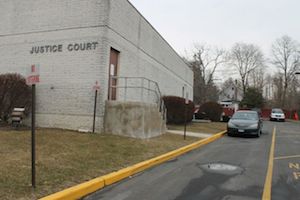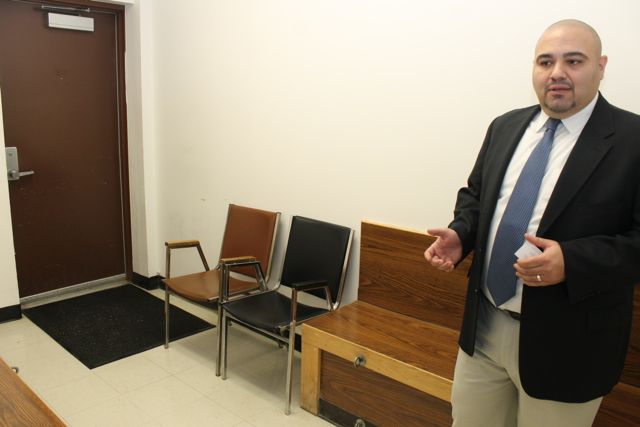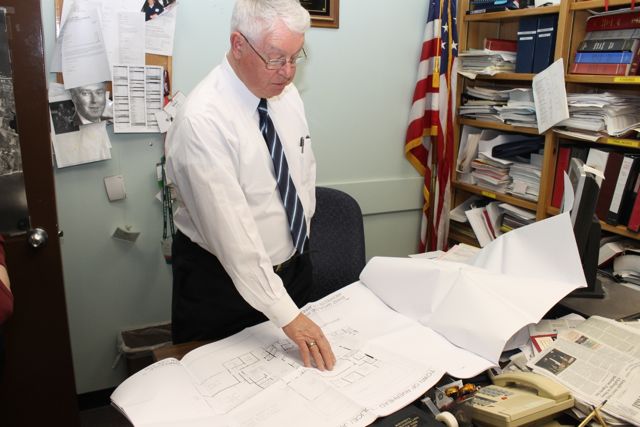When the Riverhead Justice Court was opened in 1985, the court’s criminal session was held on Monday and civil cases were heard on Wednesday afternoon, Riverhead Town Justice Richard Ehlers, who took the bench in 1988, recalls.
Today, criminal court is in session all day Monday, all day Tuesday and Wednesday mornings, with Thursdays set aside for criminal trials, Ehlers said. Wednesday afternoons are still reserved for civil cases. “Friday is left for whatever needs to be done,” Ehlers said.
Conditions today are overcrowded and unsafe and should have been addressed by the town long ago, according to the town supervisor, the two sitting town justices and just about anyone who works within the one-story building at 210 Howell Avenue, just next door to Riverhead Town Hall.
A security assessment completed in 2006 by the N.Y. Unified Court System’s public safety department documents the building’s shortcomings as far as the justice court is concerned. The security deficiencies are many and varied, according to the assessment report, a copy of which was obtained by RiverheadLOCAL.
The parking area used by judges and court personnel is not fenced and open to the public. There are no security cameras outside. There are shrubs and bushes around the building that pose security risks because they can be used to hide weapons. The entrance used by law enforcement personnel to bring prisoners into the building is in an unsecured public area.
 When a prisoner is being brought into the courtroom for arraignment from a holding cell inside police headquarters, which shares the building with the court, the prisoner is escorted through a public corridor. On days when the criminal court is in session, the hallway is often filled with with a queque of people waiting in line to pass through a security checkpoint. Because the building lacks security screening at its entrances, the people waiting in the corridor have not yet been screened for weapons.
When a prisoner is being brought into the courtroom for arraignment from a holding cell inside police headquarters, which shares the building with the court, the prisoner is escorted through a public corridor. On days when the criminal court is in session, the hallway is often filled with with a queque of people waiting in line to pass through a security checkpoint. Because the building lacks security screening at its entrances, the people waiting in the corridor have not yet been screened for weapons.
People entering the judicial wing of the building pass through a magnetometer staffed by two part-time court officers — on some days. But the magnetometer is not always staffed and operated when the court is in session — even when criminal trials are held. It is generally operated three, sometimes four days per week.
 The magnetometer counts the number of scans it completes every day. The monthly tallies hover around 2,500 scans, according to records maintained by the court officers.
The magnetometer counts the number of scans it completes every day. The monthly tallies hover around 2,500 scans, according to records maintained by the court officers.
The court officers who staff the security checkpoint, sworn peace officers who have the authority to carry weapons and make arrests, are unarmed — contrary to the Unified Court System security guidelines.
“We are the only court officers in the state that are not carrying weapons,” one court officer told RiverheadLOCAL.
Apart from safety and security concerns, the courtroom facilities are “constitutionally inadequate,” Justice Smith says.
There are no rooms for lawyers to conference privately with their clients. They must find a corner of an often-crowded public hallway to have a conversation.
 “There is no attorney-client privilege in this courthouse,” Legal Aid Society attorney Steven DeVito said this week. “It’s a struggle in general to develop the attorney-client relationship, but when you can’t even talk to the client in a private setting, it’s impossible.” DeVito said he has no alternative but to confer with clients in custody while they are shackled to a bench in a tiny holding room, usually with a number of other prisoners and a deputy sheriff present.
“There is no attorney-client privilege in this courthouse,” Legal Aid Society attorney Steven DeVito said this week. “It’s a struggle in general to develop the attorney-client relationship, but when you can’t even talk to the client in a private setting, it’s impossible.” DeVito said he has no alternative but to confer with clients in custody while they are shackled to a bench in a tiny holding room, usually with a number of other prisoners and a deputy sheriff present.
“It’s just a disaster, in my opinion.”
Harold Steuerwald, a Bellport attorney — a former assistant district attorney who also previously served as a deputy town attorney in Riverhead — said the existing courthouse is “just too small.”
The courtroom has a seating capacity of 52 people. Court officers allow no more than that inside the courtroom at any one time. The overflow (on most criminal court days there are upwards of 100 cases on the docket) waits outside the checkpoint, in the hallway shared with the police department. The line often spills outside the front door and onto the front steps of the building.
 “On many days, your client may be kept outside waiting to get in, while you’re waiting inside for him to be let in,” Steuerwald said.
“On many days, your client may be kept outside waiting to get in, while you’re waiting inside for him to be let in,” Steuerwald said.
“This is a very busy courthouse,” Steuerwald said. “It has outgrown the facility’s usefulness.”
Riverhead lawyer Lori Hulse echoed Steuerwald’s comments. “It’s always standing room only,” she said. “There are a lot of delays in proceedings because there’s not enough room in the courtroom. The facilities are woefully inadequate.”
When there’s a trial — either civil or criminal — a host of other problems crop up.
There is no jury room. When the judge needs to confer with the lawyers out of the jury’s presence, the jurors are sent outside into the hallway. There’s no guarantee that they can’t hear what’s going on inside, DeVito said. The defendant and his or her friends and family members may be in the hallway.
When the judge wants to discuss a matter with the lawyers and their clients in his chambers, they are escorted into a tiny room Smith and Ehlers share as an office. It is crammed with two desks and stacks of file boxes. There’s no room for additional chairs and no real privacy.
Jury deliberations must take place right in the courtroom. If a defendant in custody has to be arraigned, deliberations cease and the jury is asked to exit to the hallway.
There’s not enough room in the courtroom for each side to have a table to sit at during a trial.
The law requires that jurors not be made aware of a criminal defendant’s custody status, Smith said. The defendant must wear street clothes and cannot be handcuffed.
“You should see the machinations we must go through to comply with the law and still ensure that the jurors and anyone else in the courtroom is safe,” Smith said.
“The list of inadequacies of this facility goes on and on,” the judge said.
Ehlers, first elected in 1987 and Smith, first elected in 2000, have both long advocated renovations to address the deficiencies documented in the 2006 security assessment.
Ehlers said there is little-to-no disagreement that the facility needs a major upgrade or replacement.
Town develops armory renovation plan
 Plans to renovate the former N.Y. State Armory on Route 58 for use as Riverhead Town’s police and justice court complex have been developed by a committee including Justices Richard Ehlers and Allen Smith, Riverhead police brass, the deputy supervisor and the town engineer that’s been working with consulting architects and engineers hired by the town last year. They have worked to assess the condition of the armory building, which was deeded to the town in November 2011, and analyze the feasibility of repurposing the building for use as a police and court complex.
Plans to renovate the former N.Y. State Armory on Route 58 for use as Riverhead Town’s police and justice court complex have been developed by a committee including Justices Richard Ehlers and Allen Smith, Riverhead police brass, the deputy supervisor and the town engineer that’s been working with consulting architects and engineers hired by the town last year. They have worked to assess the condition of the armory building, which was deeded to the town in November 2011, and analyze the feasibility of repurposing the building for use as a police and court complex.
The plans have not yet been aired publicly or before the entire town board. The committee has “briefed” town board members individually, Walter said.
The 32,000-square-foot building, constructed by the state in the 1950s on a 5.7-acre site on Route 58 that had been transferred to the state by the Riverhead Water District, has been vacant since 2011, when the N.Y. Army National Guard’s 133rd Quartermaster Company was relocated.
The town’s working group and consultants have developed plans that provide the police department and justice court with facilities that meet security and safety guidelines established by state and national law enforcement and court administration authorities, according to Riverhead Town Justice Allen Smith.
The building was determined to be structurally sound and not in need of extensive environmental remediation, Riverhead Supervisor Sean Walter said this week. The state division of military and naval affairs had undertaken significant remediation measures prior to the conveyance to the town, Walter said.
The price tag for the construction of police and court facilities within the armory is estimated at $11.3 million, Walter said. The buildout came in at $259 per square foot, he said.
The town could finance the construction with bonds that would be issued in 2016, with the debt service first coming on the books in 2017, Walter said. The new debt would essentially replace existing debt that will have been retired by then, meaning there would be no increase in bonded indebtedness and no increase in property taxes to pay for it.
“I would not do this if it meant a tax increase,” Walter said. “And swapping this debt for existing debt that will have been paid off is actually the worst-case scenario,” Walter said. He hopes that sale and or lease of property at the Calverton Enterprise Park will allow the town to undertake the armory renovation without incurring any debt.
“What I’m mindful of is our responsibility to create a safe environment for the police department, the justices, the employees and the residents, as well as the prisoners, and we’re not doing that right now,” Walter said.
“This plan will do that and it will do that for a period of 20 to 30 years,” he said. “We can do something that will be just good enough for right now, at a somewhat cheaper cost, but that would be short-sighted.”
The supervisor said the existing police and justice court complex is an example of that kind of approach — it was obsolete and inadequate almost from the moment it was built in 1985.
‘It’s long overdue’
“Everybody agrees [the armory plan] is a good plan,” Ehlers said. “It’s long overdue.”
The Riverhead Town Board last looked at improving the justice court/police complex a decade ago.
The town board in 2003 hired H2M to study the feasibility of connecting town hall and the PD/court complex with an extension, but the plan never got off the ground.
“Things certainly haven’t gotten any better in the last decade,” Ehlers said.
When the state decided to retire the Riverhead armory, town officials and local state lawmakers agreed to seek a conveyance to the town. A bill authorizing the transfer was approved in June 2011 and signed into law by the governor that September.
The law requires the town to improve the structures on the site “for use by the police department, justice court, public safety and recreational programs developed and operated by the Town of Riverhead Police Department.” The land would revert to the state “upon termination of such use,” the law says.
The town was required by the law to petition the state office of general services to convey the site. The town board voted unanimously to submit that request on Sept. 20, 2011.
On April 2, 2013, the town board unanimously authorized a request for proposals to architecture and engineering services to assess the armory building for conversion to a police station and justice court complex.
Seven responses were submitted, which the town board-appointed committee reviewed and evaluated. On the committee’s recommendation the town board on Sept. 4, 2013 unanimously approved an $87,500 contract with EG Architects/Cashin Associates to undertake the assessment and design services specified in the RFP.
The survival of local journalism depends on your support.
We are a small family-owned operation. You rely on us to stay informed, and we depend on you to make our work possible. Just a few dollars can help us continue to bring this important service to our community.
Support RiverheadLOCAL today.
































